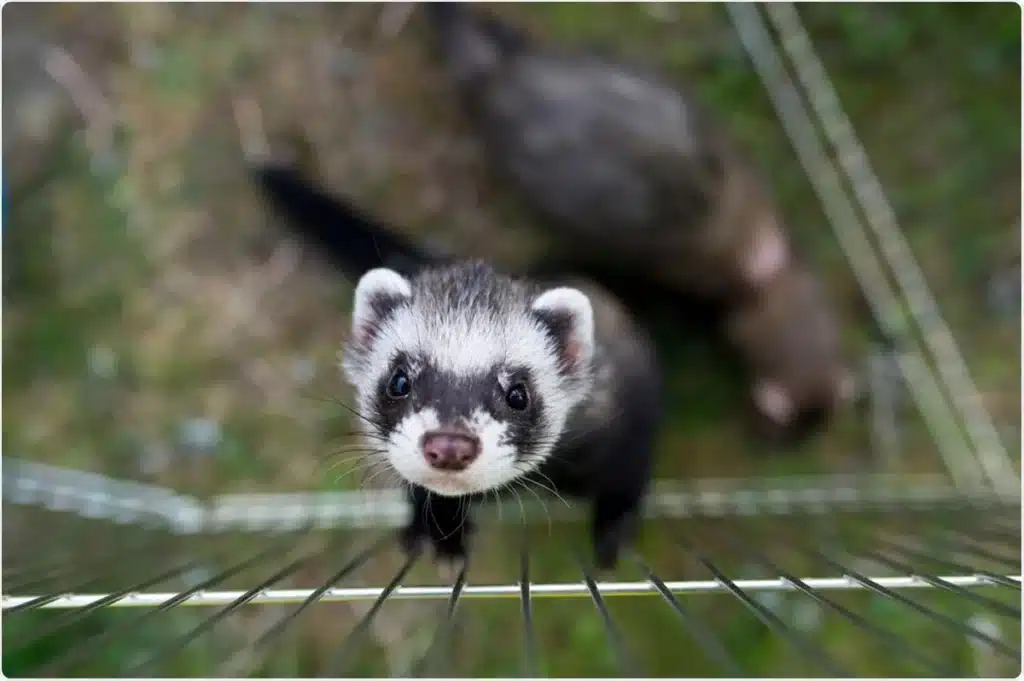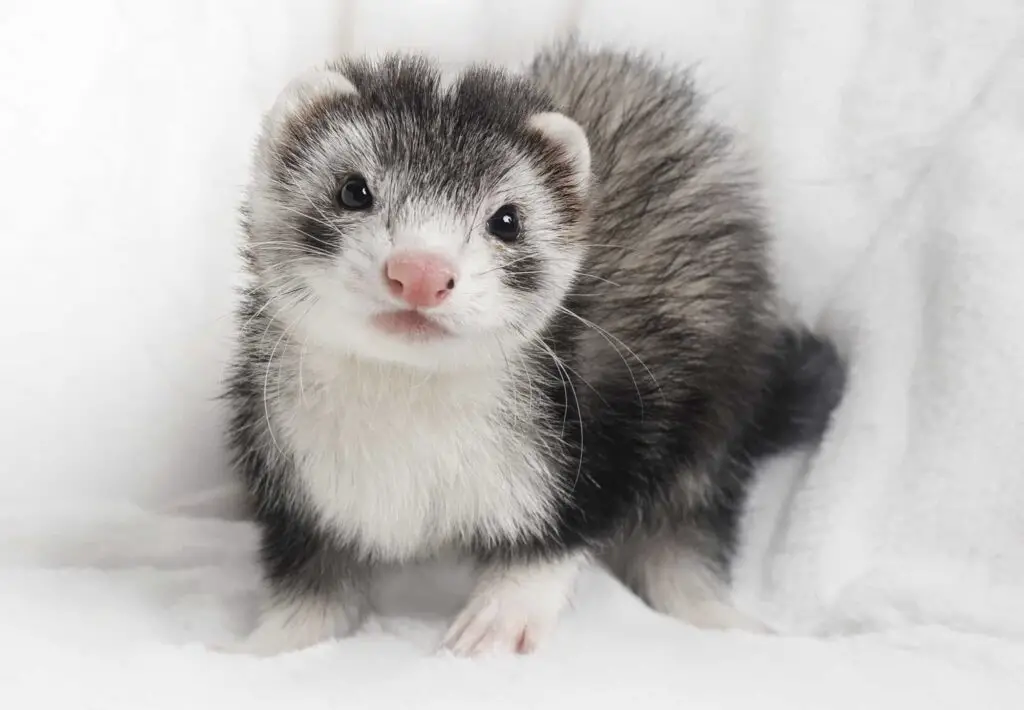Introduction
Are Ferrets Smart: Ferrets, those charming and inquisitive members of the weasel family, have long fascinated humans with their playful antics and curious nature. But beyond their endearing qualities. This inquiry delves into the cognitive abilities and intelligence of these domesticated mustelids, seeking to uncover the extent of their mental prowess and the fascinating ways in which they navigate the world around them. In this exploration, we will journey into the world of ferret intelligence, shedding light on their problem-solving skills, social interactions, and adaptive behaviors that make them both intriguing companions and enigmatic creatures of the animal kingdom. Ferrets sleep, often described as the clowns of the animal world, have captivated human imagination for centuries with their playful demeanor and boundless energy. Their endearing antics and charming personalities have endeared them to pet owners worldwide.
To assess the intelligence of ferrets is to embark on a captivating journey into the intricacies of their cognitive abilities and problem-solving skills. In this exploration, we will unravel the mysteries of their social interactions, their capacity to learn and adapt, and their ability to communicate with humans and other animals. By delving into the enigma of ferret intelligence, we hope to gain a deeper understanding of these remarkable creatures and the unique ways in which they navigate the world, forging bonds with us as cherished companions while retaining their status as charming enigmas of the animal kingdom.
As we delve further into the realm of ferret intelligence, we begin to unravel the layers of their fascinating cognitive abilities. Ferrets are known for their exceptional problem-solving skills. They possess an innate curiosity that drives them to investigate their environment, manipulate objects, and find creative solutions to challenges they encounter. This innate curiosity is often a source of both amusement and amazement for ferret owners as they watch their furry friends engage in playful exploration and problem-solving activities. Social intelligence is another facet of ferret cognition that deserves attention. These social creatures have a complex understanding of social hierarchies and communicate through a variety of vocalizations, body language, and scent marking.

Are ferrets friendly to humans?
Ferrets have an inquisitive and playful nature. They can learn to see humans as companions and form a strong bond with their owners. This makes them a popular pet choice because of their sociable and charming character.
Ferrets are inherently social animals. In the wild, they live in family groups called “businesses,” and this social instinct carries over into their interactions with humans. Ferrets often form strong bonds with their human caregivers and thrive on companionship. They enjoy being around people and can become quite attached to their owners.
One of the most endearing qualities of ferrets is their affectionate nature. They often display their love through gentle nuzzles, playful antics, and even cuddling with their human companions. Many ferret owners describe their pets as “velcro ferrets” because they like to stick close and be a part of daily activities.
Ferrets are known for their boundless energy and love for play. They have a mischievous and curious nature that makes them engaging and fun to be around. They enjoy interactive play with their owners, whether it’s chasing a toy or playing hide-and-seek.
Ferrets are skilled communicators. They make a variety of vocalizations, such as chirping, clucking, and even “dooking,” which is a joyful warbling sound. These vocalizations are often directed at their human companions, serving as a way to interact and express their feelings.
Are ferrets easier than dogs?
You’re not going to be able to train a ferret as easily as you can train a dog or a cat. A ferret won’t tell you that it has to “go” like a dog will, and he won’t take naturally to a litter box like a cat will. Litter training a ferret takes work. Lots of work.
Ferrets are much smaller than most dog breeds, making them more suitable for people with limited living space, such as apartments. They can be comfortably housed in a large cage when not supervised. Dogs come in various sizes, from tiny toy breeds to large giants. Larger dogs generally require more living space and room to roam, which can be a constraint in smaller homes.
Ferrets have high energy levels and need regular exercise and playtime outside of their cage. A few hours of supervised play in a safe, ferret-proofed space is essential to keep them mentally and physically stimulated. Dogs vary in their exercise needs, but most require daily walks and playtime. Some breeds have more demanding exercise requirements than others.
Ferrets are curious and can be mischievous, but they are generally easier to train than dogs in terms of housebreaking. They can be taught tricks and commands with positive reinforcement techniques. Dogs can vary widely in terms of trainability and behavior. Housebreaking and obedience training are often more involved with dogs, and some breeds may have more challenging behavioral issues.
Ferrets are generally low-maintenance when it comes to grooming. They have short fur that requires minimal brushing and no regular baths unless they get into something dirty. Dogs vary greatly in their grooming needs. Long-haired breeds may require frequent brushing, regular baths, and professional grooming, which can be time-consuming and costly.
Do ferrets show emotion?
A ferret that is fearful or anxious about something will usually cower down and look sideways or over its shoulder at the thing that is upsetting it. Your ferret is in a “fight or flight” mode. Your ferret may also hiss while doing this to vocalize that it is upset.
One of the most prominent and endearing emotions displayed by ferrets is their playfulness. These curious creatures often engage in playful activities like chasing toys, wrestling with each other, and even engaging in games of hide-and-seek. Play is a way for ferrets to express their joy and curiosity.
Ferrets can form strong bonds with their human caregivers and fellow ferrets. They show affection by nuzzling, licking, and cuddling. Many ferret owners describe their pets as “velcro ferrets” because they like to be close to their owners and enjoy physical contact.
Ferrets are naturally curious animals, and their inquisitiveness is a clear sign of their emotional engagement with their surroundings. They may investigate new objects, explore new areas, and display keen interest in novel stimuli.
Just like any other animal, ferrets can experience fear or stress. Common stressors for ferrets include sudden loud noises, changes in their environment, or unfamiliar people or animals. Signs of stress may include trembling, hissing, or hiding.
Do ferret bites hurt?
It’s worth noting that the ferret’s skin is thicker and tougher than human skin, so when ferrets nip at each other in play, they don’t inflict any real pain. But when they nip at a human, it can hurt.
Ferrets have long, sharp canine teeth designed for hunting and tearing food. When they bite, these teeth can easily puncture the skin, causing pain and sometimes drawing blood.
Ferrets have a natural instinct to play and explore with their mouths, which can include gentle nipping or mouthing. While this behavior is often not painful, it can be startling if unexpected.
Ferrets may bite defensively when they feel threatened, cornered, or scared. In such situations, their bites can be more forceful, and the ferret may clamp down to protect itself.
Ferrets have poor eyesight and rely heavily on their sense of smell and touch. Sometimes, they may inadvertently bite when exploring or trying to grasp an object, mistaking a finger for something else.
What is toxic to ferrets?
Pesticides such as ant bait, fly/wasp spray, slug pellets and rat poison can cause death in ferrets, as can alcohol, paint, spirits, petrol, varnish, glue and batteries. Phenols are extremely hazardous to ferrets so do not use a phenol based cleaner to clean your ferrets’ accommodation.
Contains theobromine and caffeine, which are toxic to ferrets and can lead to symptoms such as vomiting, diarrhea, rapid heart rate, and seizures. Found in coffee, tea, energy drinks, and some medications. Ingesting caffeine can cause severe health issues for ferrets. Ferrets should never consume alcoholic beverages, as even small amounts can lead to alcohol poisoning.
Cleaning products, pesticides, and other chemicals should be stored in a safe place where ferrets cannot access them. These substances can lead to poisoning if ingested or if ferrets come into contact with them.
Certain houseplants and outdoor plants are toxic to ferrets if ingested. Examples include poinsettias, lilies, azaleas, and philodendrons. Ensure that your home and yard are free of such plants.
Ferrets are notorious for chewing on objects, and they can swallow small items that are not meant for consumption. Swallowed items can cause blockages in their digestive tract, which is a medical emergency.
Do ferrets ever cuddle?
Many ferrets like to snuggle with their humans. One thing you can try is getting a hoodie with a front pocket. Your furry little pal may like to curl up in there as you’re relaxing. You can also lie down on the floor with a blanket.
Yes, ferrets are known for their cuddly and affectionate nature, and many ferret owners enjoy heartwarming cuddle sessions with their furry companions. While ferrets may not be as traditionally “cuddly” as some other pets like dogs or cats, they have their unique way of showing affection and seeking comfort through physical closeness.
Ferrets are affectionate animals and frequently nuzzle against their owners or fellow ferrets as a sign of affection. This gentle touch is a form of bonding and can be quite endearing.
Ferrets are known for their deep sleep patterns, and they often choose to sleep close to their owners. It’s not uncommon for a ferret to find a cozy spot on or near their owner during naptime.
Ferrets are playful creatures, and their cuddling sessions can sometimes turn into play. They may nibble gently or engage in playful wrestling while cuddling, which can be quite entertaining.
Can ferrets cry?
It is not so much what the ferret does as it is a change in behavior. In other words, while ferrets stoically won’t show pain or distress by crying, they often signal pain with behavioral changes.
Ferrets do not cry tears in the same way humans do, as they lack the tear ducts necessary for producing emotional tears. However, ferrets do have their own ways of expressing discomfort, distress, or pain, which may be interpreted as a form of “crying” by their human caregivers.
When ferrets feel threatened or scared, they may emit hissing or huffing sounds. This is a defensive response and not a form of crying, but it does indicate their emotional state.
Ferrets communicate a great deal through body language. When they are uncomfortable or distressed, they may exhibit behaviors such as puffing up their fur, arching their back, or tucking their tail between their legs.
If a ferret is feeling unwell or in pain, they may become lethargic and less active than usual. This change in behavior can be an indicator that something is amiss.
In moments of extreme distress or pain, ferrets may emit sharp, piercing squeals. This can be particularly distressing for both the ferret and its owner and should be taken as a sign that immediate attention is needed.
Is it OK to only get one ferret?
Ferrets love the companionship of other ferrets for comfort and play. Ferrets don’t cope well living alone and should be kept in pairs or groups. You’ll often find them having an impromptu play, charging around their enclosure and springing at each other.
Living in a small space or an apartment with limited room for multiple ferrets may make it more practical to have just one. Ensure that your living environment is appropriately ferret-proofed and spacious enough to meet their needs.
Not all ferrets get along with each other, and introducing a new ferret to an existing one can sometimes result in aggression or territorial behavior. If you have a single ferret and are concerned about potential compatibility issues, consult with a veterinarian or ferret expert before attempting introductions.
Ferrets require veterinary care, food, bedding, and other supplies. If you are concerned about the costs associated with caring for multiple ferrets, it may be more feasible to have one.
In some regions, finding a companion ferret for adoption may be challenging, as ferrets are not as widely available as other pets. If you cannot easily find a suitable companion, you may opt to have just one ferret.

Conclusion
Ferrets showcase their intelligence through their innate curiosity, problem-solving skills, and adaptability. Their capacity for social interaction and communication, both with humans and their fellow ferrets, underscores their complex understanding of social dynamics. Ferrets smart are more than just playful and endearing companions; they are intelligent beings with a knack for exploring their surroundings and devising clever solutions to various challenges. Their ability to learn and adapt, coupled with their sociable nature, has earned them a cherished place in the hearts of many as pets. While they may not rival the intelligence of some other domesticated animals, ferrets certainly hold their own in the realm of animal cognition. Their intelligence, coupled with their unique personalities and charming antics, continues to make them both intriguing and beloved members of the animal kingdom.
Whether as playful pets or subjects of scientific curiosity, ferrets remain a source of wonder and admiration for those who have the pleasure of getting to know them. In our exploration of ferret intelligence, we’ve uncovered a myriad of qualities that showcase their unique cognitive abilities. From their insatiable curiosity, which drives them to explore and interact with their environment, to their problem-solving skills that enable them to overcome obstacles, ferrets consistently demonstrate a level of cleverness that surprises and delights their human companions. Furthermore, their social intelligence and communication skills provide insights into the intricate world of ferret relationships and interactions.
Their ability to form bonds, cooperate with one another, and engage in playful behaviors not only enriches their own lives but also deepens the connections they forge with their human caregivers. Ferrets, with their quick learning and adaptability, have proven to be highly trainable and interactive pets, enhancing the lives of those who share their homes with them. While they may not be the most intellectually advanced animals in the animal kingdom, their intelligence shines through in their endearing quirks, their ability to learn tricks, and their capacity to respond to their owners’ affections. In the end, the question of whether ferrets are smart is unequivocally answered with a resounding “yes.” Ferrets, with their intelligence and charm, remain a source of joy and wonder in our lives.





No Comments